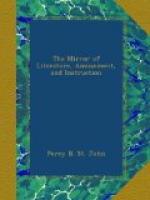Baker in The Microscope made Easy, says, “A silkworm’s web being examined, appeared perfectly smooth and shining, every where equal, and much finer than any thread the best spinster in the world can make, as the smallest twine is finer than the thickest cable. A pod of this silk being wound off, was found to contain 930 yards; but it is proper to take notice, that as two threads are glewed together by the worm through its whole length, it makes double the above number, or 1,860 yards; which being weighed with the utmost exactness, were found no heavier than two grains and a half. What an exquisite fineness is here! and yet, this is nothing when compared with the web of a small spider, or even with the silk that issued from the mouth of this very worm, when but newly hatched from the egg.”
Under the article Silk, in Rees’s Cyclopaedia, the writer says, “that those who have examined it attentively, think they speak within compass, when they affirm that each ball contains silk enough to reach the length of six English miles.”
Baker tells us, “not to neglect the skins these animals cast off three times before they begin to spin; for the eyes, mouth, teeth, ornaments of the head, and many other parts may be discovered better in the cast-off skins than in the real animal.”
P.T.W.
* * * * *
CUCKOO
Mr. Jerdan, editor of the Literary Gazette, in a letter to Mr. Loudon, says, “about fifteen years ago I obtained a cuckoo from the nest of (I think) a hedge sparrow, at Old Brompton, where I then resided. It was rather curious, as being within ten yards of my house, Cromwell Cottage, and in a narrow and much frequented lane, leading from near Gloucester Lodge to Kensington. This bird I reared and kept alive till late in January; when it fell suddenly from its perch, while feeding on a rather large dew worm. It was buried: but I had, long afterwards, strange misgivings, that my poor feathered favourite was only choked by his food, or in a fit of some kind—his apparent death was so extremely unexpected from his health and liveliness at the time. I assure you that I regretted my loss much, my bird being in full plumage and a very handsome creature. He was quite tame, for in autumn I used to set him on a branch of a tree in the garden, while I dug worms for him to dine upon, and he never attempted more than a short friendly flight. During the coldest weather, and it was rather a sharp winter, my only precaution was, nearly to cover his cage with flannel; and when I used to take it off, more or less, on coming into my breakfast room in the morning, I was recognised by him with certainly not all the cry “unpleasant to a married ear,” but with its full half “Cuck! Cuck!”—the only sounds or notes I ever heard from my bird. Though trifling, these facts may be so far curious as illustrating the natural history of a remarkable genus, and I have great pleasure in offering them for your excellent Journal.” Mag. Nat. Hist.




